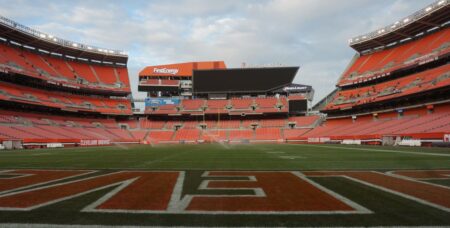Pennsylvania State University has approved a $700m (£549m/€644.7m) redevelopment project for Beaver Stadium, pledging that the revamp will retain a 100,000-plus capacity for the venue.
A 26-2 vote, with three abstaining, saw the Penn State Board of Trustees yesterday (Tuesday) back the investment needed for the renovation, which aims to grow revenue-generating opportunities, transform the fan and community experience, and fuel the future funding of all 31 athletics programs at the University.
The approved renovations are designed to enable year-round use of Beaver Stadium, further driving economic growth and development in the surrounding region, while ensuring it remains a “premier facility” in all of college athletics.
Penn State in October selected Populous to design a wide-ranging multi-year renovation of Beaver Stadium, the second largest stadium in the US. Penn State also announced the joint venture of Barton Malow, AECOM Hunt and Alexander Building Construction as the construction manager for the project.
Nations Group, a national owner’s representative firm specialising in assisting universities with the project development and construction management phases of athletics projects, was retained by Penn State as a consultant for the project.
Penn State president, Neeli Bendapudi, announced in February last year that Beaver Stadium, which has a capacity of 106,000, would undergo a major renovation project. The stadium opened in 1960 and its last major renovation was in 2001. Redevelopment has been pursued as the cost of developing an entirely new stadium had been projected at between $1.5bn and $2bn.
Initial work
Since January, when an initial $70m expenditure for the Beaver Stadium renovation was approved, steps have been underway at the stadium and will continue leading up to the 2024 college football season.
Initial construction has prioritised safety and accessibility through the widening of select concourses and the installation of new escalators, as well as field lighting performance and videoboard replacements.
Winterisation work is also ongoing, which entails the insulation of pipes and other upgrades to allow the building to be occupied when temperatures are below freezing, giving Penn State the ability to host a College Football Playoff game beginning in 2024 and other potential events beyond Penn State football games in the winter months.
“Many recognise Beaver Stadium as the best stadium in college football, and we want to preserve the atmosphere that our fans, alumni and community have come to expect while building on this history of excellence for generations to come,” Bendapudi said yesterday.
“The renovations will have a wide variety of positive impacts on our community, help us remain a national leader by attracting top student-athletes, and continue serving as a symbol for belonging and pride for students across the Commonwealth.”
Financing the future
Board of Trustees chair, Matt Schuyler, said the enhancements and modernisations described in the in-depth plan highlight the criticality of funding this project now, demonstrate this is the fiscally responsible approach, and show how renovation will propel Penn State forward to remain competitive in the future world of sports entertainment.
Including the first stage of the Beaver Stadium renovation, which was approved in May 2023, the total project will cost no more than $700m and will be completed before the 2027 college football season. The multi-year project will be financed and paid for entirely by Penn State’s Intercollegiate Athletics system.
Penn State Athletics is one of a handful of self-sustaining intercollegiate athletics departments nationwide, which means no tuition dollars or educational budget funds will be used toward the renovations. The entire project will be paid for through fundraising, concessions, naming opportunities, sponsorships and ticket sales, including new premium seating options to be added during the renovation.
Penn State has also stated that renovating Beaver Stadium eliminates approximately $200m in major maintenance backlog costs and achieves significant cost efficiencies. The Philadelphia Inquirer said the University would pay for the project by issuing bonds. Paying back the $700m over a 30-year timeline would ultimately cost $1.28bn, according to Sara Thorndike, Penn State’s senior vice-president for finance and business/treasurer.
The timeline
The project plans encompass three distinct phases over the course of the next three football offseasons and will offer a new mix of seating options and improved amenities, such as restrooms and concessions. Design plans have not been disclosed, but Penn State did offer a look at conceptual renderings yesterday.
“With home football games averaging $16.2m in tourism and economic growth in our region, the potential return on investing in a premiere football stadium is significant,” said Patrick Kraft, vice-president for intercollegiate athletics.
“Beyond the increased ability to host major events year-round as we winterise the stadium and build inventory, the experience for our fans will be greatly enhanced while providing the facilities our football program needs to continue competing at the highest level.”
Kraft emphasised that improved circulation to alleviate congestion and a focus on modernising safety and operational standards are critical to the stadium’s redesign. In alignment with Penn State’s commitment to global sustainability, the Beaver Stadium renovations will be designed with a high standard for energy efficiency, construction and eventual operation of the renovated stadium and with a commitment to achieving LEED certification.
Importantly, a new welcome centre is planned for the community that will include a 21,000-square-foot facility for events and many other uses, serve as a connection point for all in the community, and augment enrolment efforts for prospective students and future student-athletes.
Kraft said Penn State is adamant that the capacity of Beaver Stadium will remain above 100,000, post renovation. He told The Athletic: “We will be well over 100,000 and we continue to make that a priority.
“Will fans lose their seats? No. That’s why it’s important. When you have 94,000 season ticket holders (which includes student season tickets), having over 100,000 seats is critically important. There will be very, very minimal issues through the renovation.”
View a Penn State video announcement here: https://x.com/GoPSUsports/status/1792969002559349220





